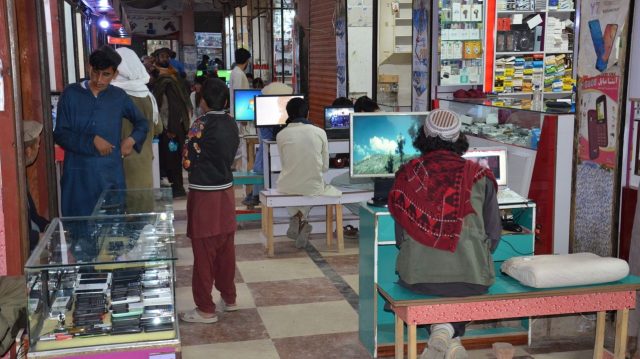
For the first time since reassuming control of its country in 2021, Afghanistan’s ruling Taliban regime this week shut down huge swaths of internet access across multiple northern provinces, which contain the nation’s major population centers. The ban applies only to high-speed fiber optic connections and is intended to “prevent immorality,” a government spokesperson said Wednesday. But for many Afghans — particularly women — the move is the latest impediment to education and economic security imposed under the Taliban. As the Afghan government vows to expand the high-speed ban for the whole country, concerns have grown over the lasting effects of such a change.
Why is high-speed internet being throttled?
The crackdown on internet access comes after the Taliban released a “long set of rules governing morality” late last year, which mandated that women wear facial coverings and men grow beards, said Reuters. These moves prompted “sharp criticism from rights groups and many foreign governments.” This new attempt to restrict access to the greater internet makes it more difficult for Afghans to “communicate, attend online classes and receive or send news,” The Washington Post said. Although the slower “mobile internet, which is not always accessible in some areas, appeared to be unaffected.”
The decision to shut down high-speed access “was taken to prevent immorality,” said Taliban government spokesperson Haji Attaullah Zaid, who attributed the order to the country’s Supreme Leader Hibatullah Akhundzada. An “alternative” means of access “will be built within the country for necessities,” Zaid said.
The ban “not only disrupts millions of citizens’ access to free information and essential services,” said the Afghanistan Media Support Organization in a statement to The Associated Press, but “also poses a grave threat to freedom of expression and the work of the media.” Coming on the heels of the Taliban’s previous digital restrictions on certain social media platforms and pornography websites, these latest measures “extend beyond media and entertainment, targeting women and girls in daily life,” said The Diplomat.
To that point, the Taliban’s Sep 17 announcement came four years to the day after the Taliban barred secondary school attendance for Afghan girls — an anniversary that “should make everyone angry — furious even,” said Human Rights Watch. As a result of the ongoing education ban, many Afghan women have “attended online classes, learned foreign languages with the help of e-books and traded cryptocurrencies in the hope of becoming financially independent,” said the Post.
“I have absolutely no idea” how e-learners can “possibly continue as full-time college students with no connection from Afghanistan,” said Lucy Ferriss, president of the board for the Afghan Female Student Outreach nonprofit, to the Post.
But while Taliban authorities publicly stand by the new restrictions, the effects have been “so biting” that many of the affected — including provincial and business leaders — have urged the government to “find an alternative,” said The New York Times.
Can the Afghan economy survive an internet ban?
A complication is that the internet shutdown is “connected to a lingering competition for power” between the Taliban’s central authority in the city of Kandahar and the “more pragmatic officials” tasked with “day-to-day” governance in Kabul, said the Post.
Any internet ban is “beyond my comprehension in such an advanced era,” said one resident of the northern province of Balkh to the AP, refusing to provide his name “for fear of Taliban reprisals.” Not only is the decision to throttle high-speed access in Balkh “absurd and unwise,” said former U.S. Special Representative to Afghanistan Zalmay Khalilzad on X, but it will “undermine investment and development” while damaging the province’s economy and the country’s “prospects as a whole.”
With 80% of Afghan business “conducted online,” the Taliban shouldn’t be widening the “gap between the people and the government any further,” said Afghan Chamber of Commerce Vice President Khan Jan Alokozai. With government agencies, customs offices, banks and media houses all reliant on fiber-optic internet, cutting the connection puts “additional pressure on central administrative structures,” said former Afghanistan Education Minister Sayed Ahmad Shah Sadaat to Germany’s Die Welt. With no “alternative internet system,” cutting off high-speed internet means “Afghanistan faces a dark time ahead.”
A new push to cut nationwide access to the digital world is taking Afghanistan back to the isolationist extremes of decades past




